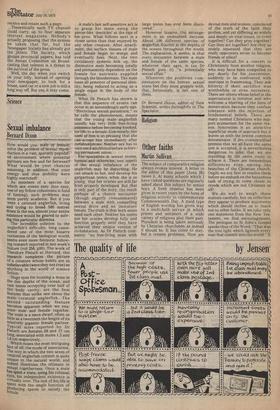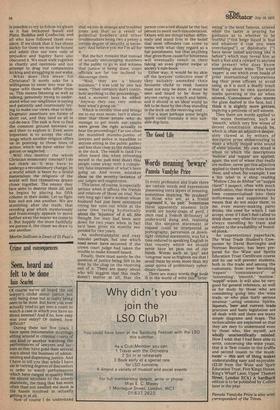/Religion
Other faiths
Xartin. Sullivan
The subject of comparative religion always evokes interest. A letter to the editor of this paper (June 28) raises it. At many schools which I have visited questions are regularly asked about this subject by senior boys. A fresh impetus has been given in recent years by the form of religious activity to commemorate Commonwealth Day. A staid type of English worship has given way to a multi-faith service in which priests and ministers of a wide variety of religions play their part. Pluralism is being taken seriously by Christian churchmen as indeed it should be. It has come to stay, but it creates problems. How are devout men and women, convinced of the truth of the faith they profess, and yet differing so widely and deeply on vital issues, to come together? Can they pray together? Can they act together? Are they so widely separated that they are really opponents never to become friends or allies?
It is difficult for a convert to Christianity from another religion, who may have been compelled to pay dearly for his conversion, suddenly to be confronted with exercises in fraternising. They ask bitterly if their sacrifice was worthwhile or even necessary. There are others whose belief in the supernatural is minimal and who welcome a blurring of the lines of demarcation because they confuse tolerance with the rejection of fundamental beliefs. There are many normal Christians who support ecumenism for the same reason. Syncretism is an attractive superficial mode of approach but it leaves us with the lowest common denominator. If the oversimplified premiss that we all have the same aim is accepted, it is nevertheless dangerous to infer that we are -travelling by the ,same route to achieve it. There are tremendous differences even among the branches of the Christian church. Ought we not first to resolve them before we embark on the hazardous task of trying to come closer to creeds which are not Christian at all?
We do well to weigh these matters carefully, but on reflection they appear to produce arguments which should incline us to reach out to other faiths. If we take only one statement from the New Testament, we find encouragement. The prologue to St John's Gospel speaks thus of the Word: "That was the true light which lighteth every man that cometh into the world." It is possible to try to follow its gleam as it has beckoned Isaiah and Plato, Buddha and Confucius, and all who have followed them ever since. If we think that it has shone darkly for them we must be honest and admit that our own veils of prejudice and bigotry have also obscured it. We must walk together in charity and openness and not attempt to drag our companions kicking and struggling in our wake.
What does this mean for Christians? It surely asks for a willingness to enter into true dialogue with those who differ from us. This means listening as well as talking, genuinely trying to understand what our neighbour is saying and patiently and courteously trying to make our views clear to him. Dogmatic assertions are forms of short cut, and they land us all in cul-de-sacs. The task is first to find the common ground between us and then to explore it. Even more important is to accept the challenge which another religion offers us in pointing to those lines of action which we have either forgotten or neglected. Will this destroy the whole Christian missionary concept? I do not think so. It may have to undergo a revolutionary change. In a world which is beset by a brutal materialism the religions of the world will find themselves drawn closer together. The enemy they face aims to destroy them all, and he begins by placing his fifth column in their midst. Let us fight him and not one another. We are stumbling after the truth, that receding goal which mysteriously and frustratingly appears to move farther away the nearer we come to it. But happily the more faithfully we pursue it, the closer we draw to one another.
Martin Sullivan is Dean of St Paul's



































 Previous page
Previous page